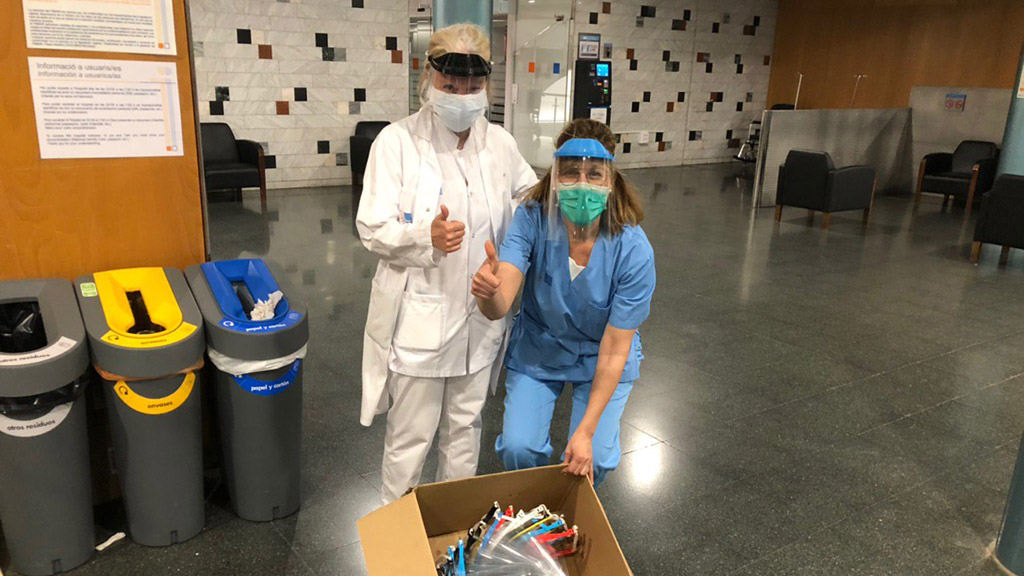"Makers" carve out their place in the world of work
Flexibility, adaptability and an ability to think on one's feet and be a team player are among the most sought-after qualities in the 2020 labour market.Makers are on their way to earning a top-notch spot on the labour market pyramid.

Many key players have emerged throughout the struggle against COVID-19. Among them, one particularly altruist community of individuals spread across Spain has stood up as a shining example of creativity, efficiency, effectiveness and coordination. We are, of course, referring to the so-called "makers", whom César García, co-founder of Makespace Madrid, defines as "curious individuals who see the technology around them, conduct their own research and learn by doing, coming up with solutions in the process". Eager to lend a hand, upwards of 20,000 researchers, developers, engineers and entrepreneurs have created the Coronavirusmakers network. In less than two months' time, the network's members have manufactured and distributed 722,944 visors, 100,000 masks, 20,000 surgical gowns and a long list of other essential healthcare materials, including ventilators and solenoid valves.
According to the experts, the most in-demand traits in the labour market coincide with those embodied by this group in their effort to design and manufacture healthcare material from their homes or in labs using 3D printers and laser cutters.
Harnessing collective intelligence to devise quick and efficient solutions
Àngels Fitó, the UOC's Vice President for Competitiveness and Employability, had this to say about the initiative: "The maker community has proven its ability to turn collective ideas into real-life solutions, as well as demonstrating a capacity to react quickly and efficiently that puts other players in the system to shame." She added: "By combining the members' knowledge of tech, their social engagement and their key traits, such as a collaborative and entrepreneurial spirit, the movement has been able to equip the healthcare community with essential materials in the midst of a crisis."
Their key to success is based on networked organization, which is often seen in new open collaboration networks, and on their ability to pool the forces of technology, innovation, social commitment, self-reliance and partnerships with companies and government agencies.
The UOC vice president pointed out that "creativity, adaptability, flexibility and the ability to work together and fit the need are more coveted than ever in competence-based selection processes". According to a report by Udemy for Business, a growth mindset (wanting to develop and outdo oneself), creativity, concentration, innovation, critical thinking, leadership and emotional intelligence are among the soft skills that will give hopeful job seekers a competitive edge in 2020's labour market.
Vital to society
Víctor Barahona, member of Impact Hub Donostia, also had something to say about how quickly makers are able to respond to emerging needs, highlighting that their ability to react in this way is what makes them so vital to society. He said: "Industry's response times to challenges like this are slow; makers have this ability to innovate quickly."
According to a study titled Employability and Career Success: Bridging the Gap between Theory and Reality, the ability to adapt to any given circumstance, the willingness rise to new challenges, teamwork and drive are the qualities employers are looking for in their top candidates.
The way César García sees it, makers are on their way to earning a top-notch spot on the labour market pyramid. He said: "New professions are rapidly being created in the tech sphere. This, coupled with the fact that a large portion of our lives is organized around our work, impels us to reflect further on the future of this group's work and predict any potential new challenges. I'm certain that the challenge will be to learn to adapt to hyper-specialized niches without prior training."
Challenges of the Fourth Industrial Revolution
In 2016, the World Economic Forum published a report under the title The Future of Jobs. Even by then, the institution had already predicted that the ability to work in a team would be one of the top-rated skills for ensuring a job in the so-called Fourth Industrial Revolution. The report underlined that in the midst of the current revolution, artificial intelligence, robotics, nanotechnology, genetics, biotechnology and 3D printing would become key areas, this last one proving vital to the development of Coronavirusmakers.
Until now, 3D printing was mainly used in the automotive industry, whilst also serving as a useful tool in other sectors, such as healthcare. However, those working with 3D printing do not hesitate to point out that simply understanding how the technology works is not enough. Knowledge exchange and team creativity are also of the utmost importance. Gatherings have been organized among members of the sector for this very purpose. The SIMO Educación fair is one good example, as it features a makers stand.
By displaying these skills, makers can hone their ability to learn by building, as colleagues who share their advancements rather than competitors. Víctor Barahona said: "Most makers like to build relationships, socialize and learn from one another. That's why we use social media, especially Twitter, and meet up at different maker events and fairs."
On Thursday 12 May, Barahona, alongside Àngels Fitó, César García and Jaime de los Ríos, founder of the Arteklab open art and science lab, will take part in a webinar organized by Impact Hub Donostia and the UOC to discuss the future of makers following COVID-19.
Press contact
-
Editorial department
